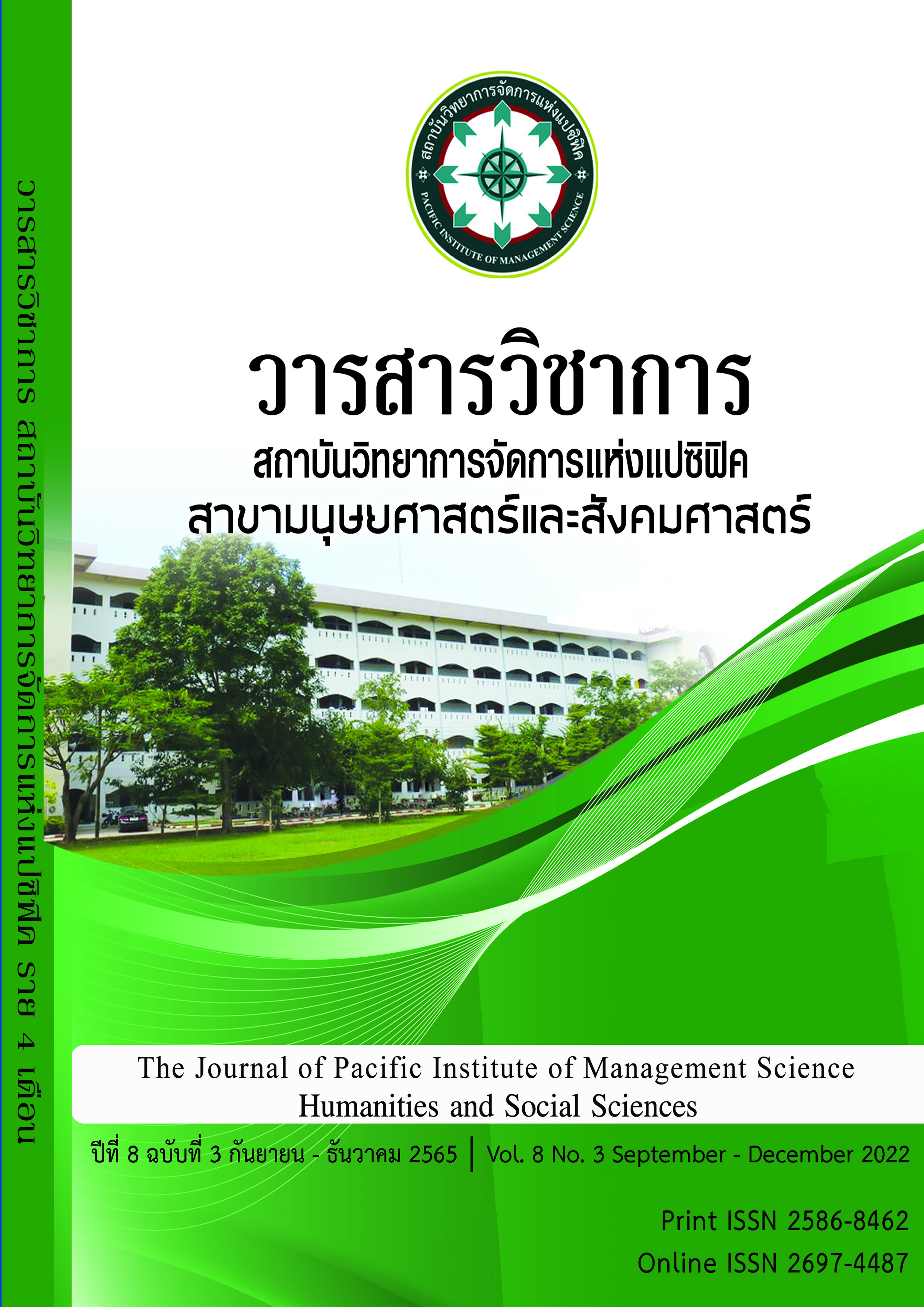Educational Policies related to English Language Teaching in Asia : Case Studies of 5 Countries
Keywords:
Educational Policy, English Language Teaching, English teacherAbstract
In the 21st century, English is used worldwide; therefore, it plays a key role in improving each country's development, competitiveness, and increasing cooperation with one another. Fluent English users have better job opportunities, more chances to explore the world further, and the more people they can communicate with, the more business opportunities they gain, resulting in a better economic status and prosperity. The governments of five selected countries namely, China (Hong Kong), Japan, Korea, Taiwan, and Thailand have seen this significant factor and are trying to raise their citizens' English proficiency. Each has launched interesting policies. After the implementation, some policies faced too many obstacles and some have shown bright future. In this paper, each country's background, policies related to English teaching, problems, and some possible solutions will be discussed. All of the countries' common problems are: a lack of competent native English teachers, limited budget for policy implementation, and the conflict between the outdated grammar-translation approach of teaching and learning and the modern communicative language in daily life. These problems are not rooted in classrooms but the whole system; therefore, to achieve each country's national plan or follow its roadmap, each government needs to understand its country's context and establish a government organization which deeply understands the situations, both from local and international perspectives, to manage this particular aspect effectively.
References
Baker, W., & Jarunthawatchai, W. (2017). English language policy in Thailand. European Journal of Language Policy, 9(1), 27-44. doi:10.3828/ejlp.2017.3
Chung, J. & Choi, T. (2016) English Education Policies in South Korea: Planned and Enacted. English Language Education Policy in Asia., 281-299. doi:10.1007/978-3-319-22464-0_13.
Evans, S. (2000). The medium of instruction in Hong Kong: policy and practice in the new English and Chinese streams. Research Paper in Education, 17(1), 97-120. Retrieved from https://doi.org/10.1080/02671520110084030
Foley, J. A. (2005). ENGLISH IN…THAILAND. RELC Journal, 36(2), 223-234. doi:10.1177/0033688205055578
Glasgow, G. P. (2014). Teaching English in English, 'in principle': The national foreign language curriculum for Japanese senior high schools. International Journal of Pedagogies & Learning, 9(2), 152-161. doi:10.5172/ijpl.2014.9.2.152
Glasgow, G. P. & Paller, D.L. (2016). English Language Education Policy in Japan: At a Crossroads. English Language Education Policy in Asia, 11, 153-180. Springer, Cham. Retrieved from https://doi.org/10.1007/978-3-319-22464-0_7
Hagerman,C. (2009). English Language Policy and Practice in Japan. Retrieved from http://www.wilmina.ac.jp/ojc/edu/kiyo _2009/kiyo_06_PDF/2009_04.pdf
Hayes, D. (2009). Learning Language, Learning Teaching: Episodes from the Life of a Teacher of English in Thailand. RELC Journal, 40(1), 83-101. doi:10.1177/0033688208101446
Hayes, D. (2010). Language learning, teaching and educational reform in rural Thailand: An English teacher's perspective. Asia Pacific Journal of Education, 30(3), 305-319. doi:10.1080/02188791.2010.495843
Hengsadeekul, C., Koul, R. r., & Kaewkuekool, S. (2014). Motivational orientation and preference for English-medium programs in Thailand. International Journal of Educational Research, 6635-44.
ITS Education Asia. (2022). The native English teacher (NET) scheme in Hongkong. Retrieved from https://www.itseducation. asia/article/the-native-english-teacher-net-scheme-in-hong-kong
Laopongharn, W., & Sercombe, P. (2009). What relevance does intercultural communication have to language education in Thailand?. Annual Review of Education, Communication & Language Sciences, 659-83.
Luxin, Y. (2016). The Influence of Chinese Educational Policy on Teachers of English. Oxford Studies in Comparative Education, 26(1), 77-91.
Office of Basic Education Commission. (2017). English development policies. Retrieved from http://www. moe.go.th/moe/ th/news/detail.php?NewsID=48458&Key=news2
Partnership Forum for 21st-Century Skills. (2015). P21 Framework Definitions. Retrieved from http://www. p21.org/storage/ documents/docs/P21_Framework_Definitions_New_Logo_2015.pdf
Poon, A. Y. K., & Lau, C. M. Y. (2016). Fine-tuning medium-of-instruction policy in Hong Kong: Acquisition of language and content-based subject knowledge. Journal of Pan-Pacific Association of Applied Linguistics, 20(1), 135-155.
Peterson Institute for International Economics. (2018). What is Globalization? Retrieved from https://www.piie.com/microsites/ globalization/what-is-globalization
Prapphal, K. (2008). Issues and trends in language testing and assessment in Thailand. Language Testing, 25(1), 127-143. doi:10.1177/0265532207083748
Rigby, K. A. (2021). Evolution and Impact of English Language Policy in Taiwan. Sally McDonnell Barksdale Honors College. University of Mississippi. Retrieved from https://egrove.olemiss.edu/cgi/viewcontent.cgi?article=2746&context=hon _thesis
Robert, R.(2015). What's new in English language teaching? Retrieved from https://www.britishcouncil.org /voices-magazine/whats-new-english-language-teaching
Shelton, M. (2015). English Language policy in the Republic of South Korea. Retrieved from https://www.academia.edu/13172210/English_Language_policy_in_the_Republic_of_South_Korea
Tan, C. (2016). Tensions and challenges in China’s education policy borrowing. Educational Research, 58(2), 195-206. doi:10.1080/00131881.2016.1165551
Tanielian, A. R. (2014). Foreign language anxiety in a new English program in Thailand. International Education Journal: Comparative Perspectives, 13(1), 60-81.
Tsai, W. (2010). English Development & Policy in Taiwan: A Guide for Native English-Speaking Teachers. University of Wisconsin – La Crosse. Retrieved from https://www.uwlax.edu/globalassets/offices-services/tesol/taiwan-nes-teacher-guide-wen-feng-tsai-2010_1.pdf
Wall, U. (2008). A Needs Assessment Interview: The Professional Development Needs of Non-native Speaking EFL Teachers in Thailand. Innovation In Language Learning & Teaching, 2(1), 47-64. doi:10.2167/illt02
Wang, L., & Lin, T. (2013). The representation of professionalism in native English-speaking teacher’s recruitment policies: A comparative study of Hong Kong, Japan, Korea and Taiwan. English Teaching: Practice & Critique (University of Waikato), 12(3), 5-22. Retrieved from https://files.eric.ed.gov/fulltext/EJ1017167.pdf
Wannachotphawate, W. (2015, March). English Language Development Policy: Foreign Teachers, Hegemony, and Inequality of Education in Thailand. Paper presented at the 1st International Conference on Educational Studies (ICES- 2015). Retrieved from https://eric.ed.gov/?q= Wannachotphawate+&id=ED556354
Widyastuti, A. (2019). English Language Education Policy in Indonesia and South Korea. Faculty of Teacher Training and Educaion , Mulawarman University.
Wiley, T. G., & García, O. (2016). Language Policy and Planning in Language Education: Legacies, Consequences, and Possibilities. Modern Language Journal, 10048-63. doi:10.1111/modl.12303
Downloads
Published
Issue
Section
License
Copyright (c) 2022 Pacific Institute of Management Science

This work is licensed under a Creative Commons Attribution-NonCommercial-NoDerivatives 4.0 International License.
บทความที่ได้รับการตีพิมพ์เป็นลิขสิทธิ์ของ สถาบันวิทยาการจัดการแห่งแปซิฟิค
ข้อความที่ปรากฏในบทความแต่ละเรื่องในวารสารวิชาการเล่มนี้เป็นความคิดเห็นส่วนตัวของผู้เขียนแต่ละท่านไม่เกี่ยวข้องกับสถาบันวิทยาการจัดการแห่งแปซิฟิค และคณาจารย์ท่านอื่นๆในสถาบันฯ แต่อย่างใด ความรับผิดชอบองค์ประกอบทั้งหมดของบทความแต่ละเรื่องเป็นของผู้เขียนแต่ละท่าน หากมีความผิดพลาดใดๆ ผู้เขียนแต่ละท่านจะรับผิดชอบบทความของตนเองแต่ผู้เดียว







